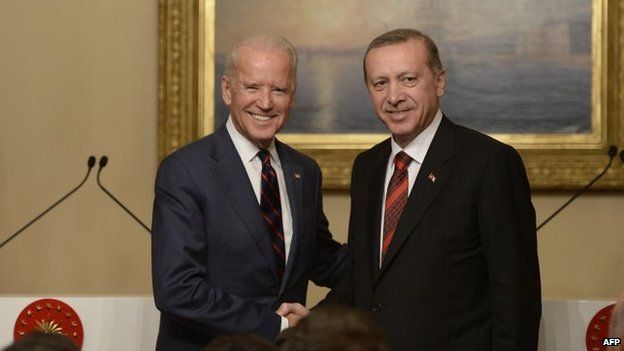US and Turkey discuss 'strengthening Syrian opposition'
- Published

US Vice-President Joe Biden and Turkish President Recep Tayyip Erdogan have discussed ways to defeat Islamic State and strengthen the Syrian opposition.
Mr Biden, who is in Turkey for talks, said they discussed how to pursue a "political transition" in Syria.
The US wants a bigger Turkish role in the fight against IS, but Turkey wants this linked with plans to remove Syrian President Bashar al-Assad.
Mr Biden also praised Turkey's role in supporting Syrian refugees.
Speaking at the joint press conference after the meeting. Mr Biden said that they had discussed the crises in Iraq and Syria in "considerable detail".
"We spoke about our work as part of an international coalition to degrade and eventually defeat Daesh," he said, using an Arabic name for Islamic State.
He added that they had discussed a range of issues in Syria, including the need to deny Islamic State "a safe haven" and "strengthen the Syrian opposition and pursue a political transition away from the Assad regime".
Mr Erdogan said: "We want to continue our co-operation with the United States by strengthening it."
Mr Biden, who is in Turkey for a three-day tour, said that Turkey was "carrying a heavy humanitarian burden", with over 1.6m Syrian refugees in Turkey.
He also announced an additional $135m (£86m) in humanitarian aid for civilians affected by Syria's civil war.
The meeting came amid reports of strains between the two countries over Syria, and Turkey's role in the fight against IS.
Turkey has pressed for a no-fly zone in Syria but has not won US backing.
Mr Biden and Mr Erdogan have also had a public row over foreign jihadis crossing Turkey's border with Syria.
Last month, the US vice-president said that Mr Erdogan had privately admitted Turkey had allowed foreign jihadists to enter Syria.
This was angrily denied by the Turkish president, who called his relationship with Mr Biden "history".
Mr Biden's office said he had apologised, but the vice-president then said it was not an apology, merely a clarification.
'Friends'
On Friday, Mr Biden held talks with Prime Minister Ahmet Davutoglu, who praised the "deep-rooted" relationship between the countries.
Mr Biden said: "We've been friends for a long time and one of the great advantages of being back in Turkey with a friend and Nato ally is we're always direct with one another."
IS militants have seized large areas of Iraq and Syria this year, forcing hundreds of thousands of people to flee their homes.
On Saturday, Iraq's army launched an operation to retake parts of Ramadi, a city in Anbar largely controlled by IS.
The jihadists control almost all of Anbar, despite operations by the Iraqi army backed by air strikes from the US and its allies.
Turkey's main contribution to the military campaign against IS has been to allow some Kurdish fighters from Iraq to travel through Turkey to assist in defending the Syrian town of Kobane near Turkey's border.